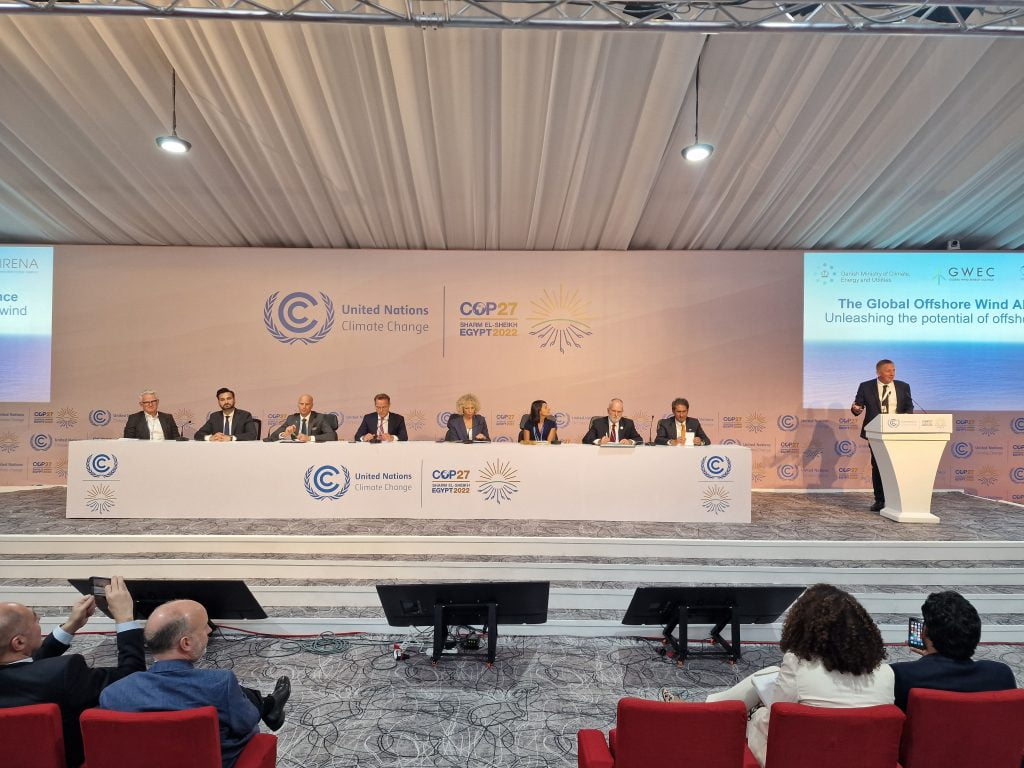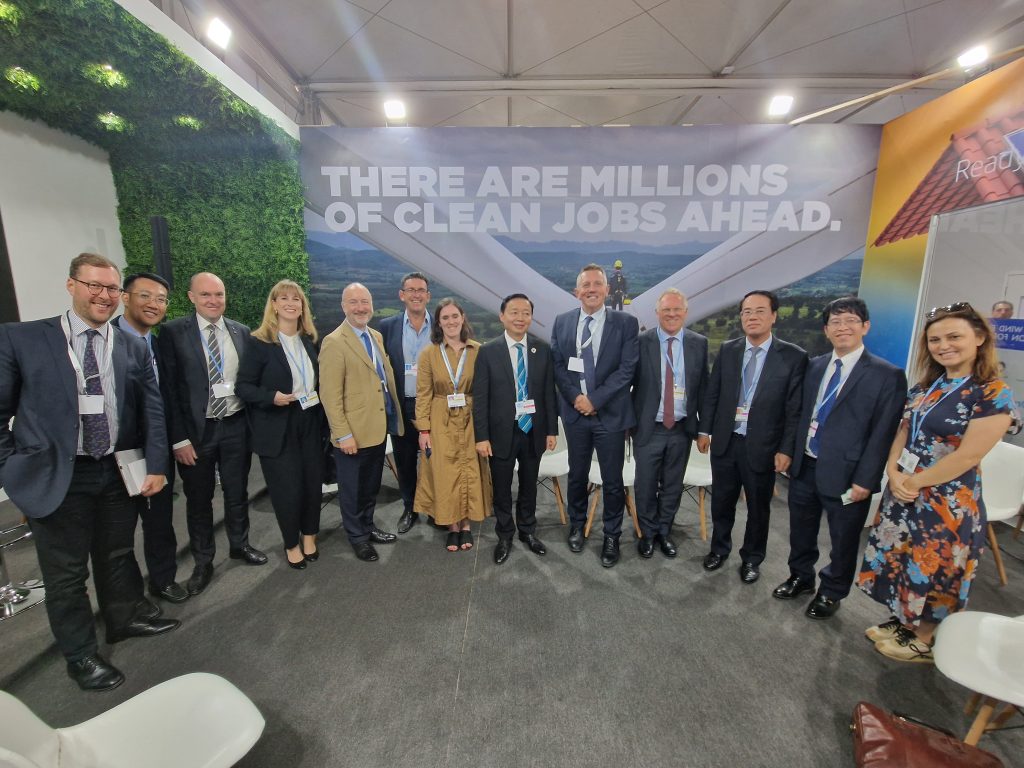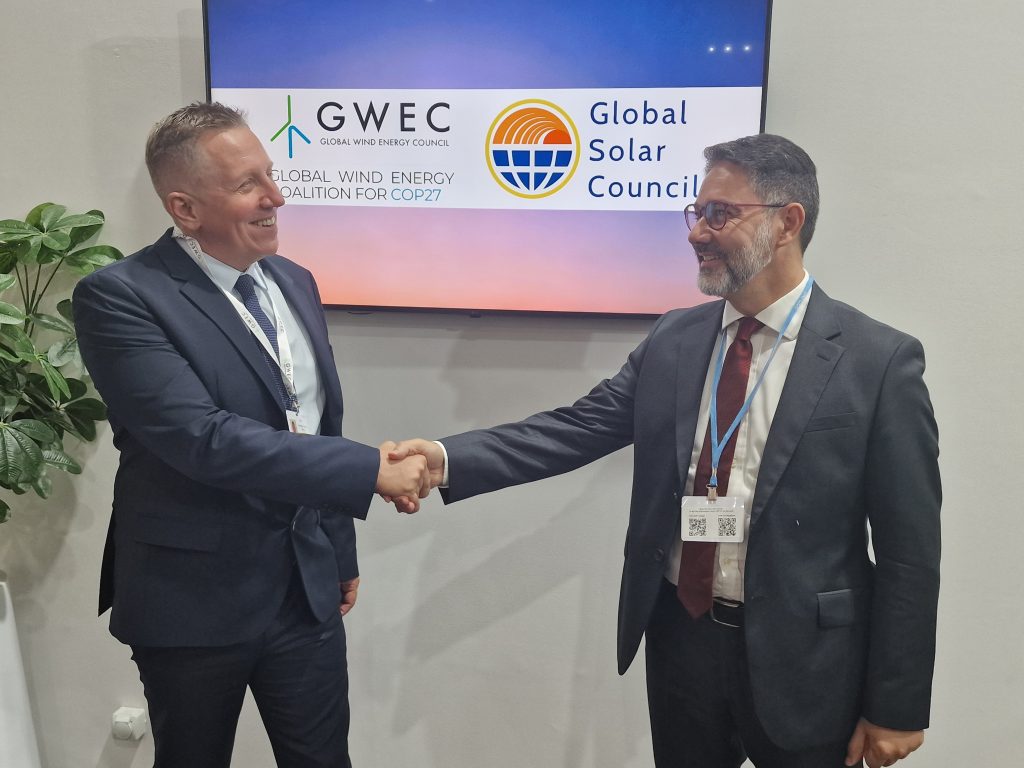This report outlines the status of the global wind supply...
The Global Wind Energy Council
at COP28
COP28 represents an opportunity for climate leaders to convene and strengthen ambition and implementation for a more climate-resilient world. A step change in wind and renewable energy growth in this decade will be the most impactful commitment that the global community can undertake now to secure a liveable future for all.
To achieve a 1.5°C pathway, governments, industry, investors and civil society must collectively commit to tripling global renewable energy capacity by 2030 at COP28. This would mean scaling annual installations of wind energy by 3-4 times by the end of the decade, putting wind energy on-track to generate one-fifth of the world’s electricity by 2030 and one-third of the world's electricity by 2050.
Why Wind?
The energy and industrial sectors are currently responsible for most global GHG emissions, generating 58% of the world’s net emissions in 2019. Last year, power sector emissions reached an all-time high, and the UN assessed that no country is currently on a credible pathway to 1.5°C. The time for incremental, marginal change is over. A global target to 2030 sends a clear signal to governments, industry, investors and civil society on the unprecedented scale and speed of renewables deployment required over the next eight years to limit global warming to a 1.5°C pathway.
Massively scaling up utility-scale wind energy is a clear “win-win” in terms of lowering energy prices, stimulating investment, economic growth and job creation and achieving climate targets while supporting energy security. It draws on limitless and indigenous energy resources, enabling countries to reduce dependency on imported fossil fuels and restore a healthier balance of trade. And it can be achieved while supporting harmonious co-existence of land and ocean users.
5 GW OF ONSHORE WIND GENERATES
14B
US DOLLARS OF INVESTMENT
130K
JOBS
4.9M
HOMES POWERED BY RENEWABLE ENERGY PER YEAR
28.8M
WATER SAVINGS
240M
METRIC TONNES OF CO2 EMISSION SAVINGS
How We Can Scale Wind To 2030
Ambition and policy certainty
Commit to ambitious energy transition plans/milestones to allow the wind industry to plan for efficient supply chain development. These plans should be specific and concrete, reflected in updated NDCs by the end of 2023 and enshrined in national policy frameworks, ideally in the form of legally binding renewables targets. They should include ambitious wind-specific targets with a long-term horizon and a frequent schedule of sizable capacity allocations for procurement.
Permitting
Governments, industry and civil society need to urgently collaborate to accelerate permitting schemes, in order to unblock the flow of investment into the wind sector and build wind projects faster. The wind sector has a strong record of harmonious development with nature and communities, and is committed to protecting the environment and biodiversity while accelerating growth. Policymakers should consider mandated lead times to permit wind projects, and dedicated “one-stop shop” focal points to streamline the siting and permitting process.
Grids
Grid action plans are urgently needed to upgrade and modernise grids for the energy systems of the future. In many countries, wind projects face delays in connecting to the grid, and thermal plants retain priority grid dispatch. Decarbonised economies will need flexible and responsive grid systems that draw upon large shares of renewable energy and technologies like storage, green hydrogen and demand-side response. Planning, investment and financing frameworks for grids must scale up within this decade – including tripling the investment in grid and transmission infrastructure globally by 2030 – to ensure renewable energy can be efficiently integrated.
Supply chain
Given the volatility for commodities and logistics in the last few years, we need critical tools like government supported/led industrial supply chain reviews which can help to secure a cost-efficient and sustainable supply chain for the transition. As wind power expands, GWEC analysis finds that spare capacity to meet forecast capacity (not including increased capacity under a 1.5°C scenario) in the global wind supply chain is likely to disappear by 2026. It must be understood that without well-functioning and competitive industrial supply chains and access to raw materials and components, there is no energy transition. A healthy supply chain would also ensure North-South technology transfer and knowledge-sharing, contributing to a just and equitable transition.
Procurement and market design
New utility-scale wind and solar are the cheapest source of new electricity in countries which account for more than 80% of global electricity generation and 85% of global GDP, including in all G20 countries except for Indonesia, Russia, Saudi Arabia and South Korea (BNEF). But in many countries, wholesale market design, inflation, rising financing costs and rigid procurement contracts are leading to insufficient remuneration to wind energy generators and supply chain actors. This means the industry lacks the massive working capital needed to invest in new high-CAPEX utility-scale projects, and further technology innovation and R&D needs for the transition; in extreme cases, this has led to contract renegotiation or cancellation.
- While wind will continue to out-compete fossil fuels in wholesale markets, supply-side pressures and financing rates are fundamental business challenges and current design of liberalised power markets undermines the revenue case for renewables.
- Market and policy frameworks need to evolve to integrate multiple objectives, including the implementation of long-term price signals to attract the required investments in renewables, short-term efficient dispatch of electricity, avoidance of long-term lock-in of fossil fuels infrastructure, forward-planning in grid infrastructure, pricing of negative externalities and unlocking flexibility through technology and innovation. Procurement mechanisms, whether “contracts for difference” or a bilateral PPA, must evolve to incentivise investment in high-CAPEX wind and power infrastructure, advance larger and continuous volumes for procurement and share the risks of the current global inflationary environment. This would go a long way in recognising the economic, social and environmental value of wind and renewable energy, and interrupt the dangerous “race to the bottom” for renewables on cost alone.
Repowering
Governments of mature wind markets where turbines are reaching end-of-lifetime should implement repowering and circular economy frameworks to efficiently boost wind generation in the power mix without requiring development of new sites or long consenting timelines.
Nature-positive transition
The wind industry’s expansion and targets should be integrated into wider national and sub-national environmental and biodiversity strategies, in order to ensure a nature-positive approach to project development.
Level playing field
Governments, industry and civil society need to urgently collaborate to accelerate permitting schemes, in order to unblock the flow of investment into the wind sector and build wind projects faster. The wind sector has a strong record of harmonious development with nature and communities, and is committed to protecting the environment and biodiversity while accelerating growth. Policymakers should consider mandated lead times to permit wind projects, and dedicated “one-stop shop” focal points to streamline the siting and permitting process.
International solidarity
Greater international cooperation between developed and developing economies is needed to ensure financial and technical resources are mobilised to support developing economies in the global energy transition. This leadership should be shown by the G7 and G20 country groupings, ahead of and during COP28.
Public-private collaboration
Private sector input from the wind energy sector must be considered a vital element of climate planning and finance initiatives relating to the global energy transition, accelerated renewables deployment, technical assistance in renewable energy growth in developing economies and development of a robust global carbon market.
Where To Find Us
Blue Zone | Global Renewables Hub
Mobility District | MA15

Introducing The Global Renewables Hub
This year GWEC has joined the Global Renewables Alliance and International Renewable Energy Agency (IRENA) in the Blue Zone to form the Global Renewables Hub. A collaborative commitment target between the members of the Global Renewables Alliance and IRENA to triple renewable energy capacity by 2030 at COP28 this year will be the most impactful commitment that the global community can undertake now to secure a liveable future for all.
To effectively fight climate change, we need to phase out fossil fuels from the world’s energy system and accelerate wind energy and other renewables, which will set the stage for technologies like green hydrogen and long-duration energy storage to take off. This will support the full decarbonisation of the world’s electricity sector – which will in turn be the foundation for modern, climate-resilient economies and a net zero energy system.
This year, GWEC is collaborating with the Global Renewables Alliance for events. Visit The Official Global Renewables Hub page for more information and the joint schedule. The schedule for GWEC led events are listed below.
GWEC's Event Schedule
10:00 - 11:15 Attracting investments for the energy transition in the Global South, spotlighting innovative industry solutions to un-lock private capital (Ground Floor)
The Bridgetown Agenda takes center stage at COP28, focusing on attracting crucial investments for the energy transition in the Global South and levelling the playing field for countries that are burdened by debt and negative impacts of climate crisis-induced extreme weather events. This side event will focus on the pivotal role of Multilateral Development Banks (MDBs) in advancing renewable energy projects in developing countries. Industry experts and policymakers will explore innovative financial mechanisms and risk mitigation strategies to attract private sector investments, spotlighting successful case studies. By aligning MDB efforts with the Bridgetown Agenda, the financing sector can unlock the potential for transformative energy projects, propelling the Global South towards a more resilient future.
Speakers
- Tim Gould, Chief Energy Economist, International Energy Agency
- Ole Kjems Sørensen, Partner, CIP Growth Markets Fund
- Peter Mørch, CEO PensionDenmark
- Eduarda Zoghbi, UNDP Advisor to the Group for Energy Governance and Bilateral and Multilateral Development Officer, RMI
- Ben Backwell, CEO Global Wind Energy Council





11:30 - 13:00 Accelerating renewable energy deployment and solutions to achieve a global renewables target (UNFCCC Side Event: SE Room 1 - Blue Zone)
Achieving 1.5C requires urgent global effort to accelerate renewable energy deployment. The solutions are clear: address key policy, market and regulatory barriers to unlock mechanisms and finance supporting cost-efficient renewable energy, while respecting environmental and social aspects.
Speakers
- Francesco La Camera, Director General, International Renewable Energy Agency (IRENA)
- Ben Backwell, Chief Executive Officer, Global Wind Energy Council (GWEC)
- Joojin Kim, Managing Director and CEO, Solutions for Our Climate (SFOC)
- Louise Burrows, Climate and Energy Diplomacy Lead, Beyond Oil and Gas Alliance (BOGA)
- Luisa Sierra Brozon, Energy Director, Iniciativa Climática de México (ICM)
- Leo Roberts, E3G
- Jihye Choi, ESG Professional, LG Energy Solutions





12:00 - 13:15 Securing the global supply chain for wind energy (First Floor)
The global wind energy sector is rapidly expanding, and efficient supply chains are crucial for its success. The covid-19 pandemic higlighted the risks associated with disruption of supply chains and the recent surge in demand for metals and critical minerals showed the importance of access to sustainable and affordable raw materials and electronic components. During this side event, industry leaders will discuss the benefits of localising wind power supply chains and identify opportunities for collaboration and innovation. They will also provide recommendations for future developments in the areas of sourcing of raw materials and manufacturing. The panel will focus on strategies to create a resilient supply chain that accelerates wind energy deployment, fosters local manufacturing, and ensures sustainable growth.
Speakers
- Ben Backwell, CEO, GWEC
- Morten Dyrholm, Group Senior Global Vice President, Vestas
- Wu Gang, Chairman, Goldwind
- Lars Holm, Partner and Director, Boston Consulting Group
- Feng Zhao, Head of Strategy and Market Intelligence, GWEC


12:00-14:00 GOWA Ministerial: Charting the Course for Offshore Wind Energy (Ground Floor)
More information soon.

12:00-13:15 JETPs - Enabler for a Just Energy Transition (First Floor)
The energy transition can no longer be decoupled from a just transition. Both need to exist simultaneously. A just energy transition must encompass the delivery of a fair and inclusive shift to a renewables-based energy system that provides equitable opportunities for all. This side event will explore the opportunities that arise from implementation of Just Energy Transition Partnerships (JETPs), including workforce development, productive uses of energy for local communities and improved gender equality. The event will spotlight successful community engagement models that empower local populations to actively participate in renewable energy projects in order to achieve a just energy transition.

10:00-11:15 Implementing a Plan of Action: Investing in Grids as an Energy Transition Enabler (Ground Floor)
Ageing, insufficient and disconnected grid infrastructure is a risk that needs to be addressed globally to avoid slowing down the energy transition. Governments should mandate and support the build-up of the electricity grid networks to integrate large and growing volumes of renewable energies. The renewables industry needs a strong and long-term commitment. Technical and regulatory barriers to renewables integration persist and are growing.
This panel will stress the urgency of addressing these risks with increased planning, urgent scaling of investment and buildout both at transmission and distribution level to deploy RE technologies more efficiently and sustainability. The event will discuss new types of partnerships between the private sector and governments to expand grids that would safeguard the strategic value of grids as national security assets.

12:00-13:15 In the driving seat of the African renewables and green hydrogen economy (First Floor)
African governments and project developers have made ambitious plans for green hydrogen and its derivatives to ensure that the region’s green hydrogen potential can be reached. This session will showcase the flagship policies and projects that are not only key to reaching net zero, but also ensuring that citizens can benefit from increased renewable energy access, clean water supply and green jobs.

14:00-15:15 Powering Asian economies with renewables and green hydrogen (First Floor)
The coming decade will be crucial to mitigate climate change, and a just pathway to net zero will not be possible without green hydrogen. With high renewables potential and significant import and consumption of hydrogen and ammonia, the Asia Pacific region is uniquely positioned to produce green hydrogen competitively, to decarbonize industries which are hard to electrify and to ensure energy security and self-sufficiency. This event will bring together government and industry leaders in Asia to launch the Asia Green Hydrogen Alliance to intensify collaboration and supercharge development of green hydrogen projects in the region. The Alliance will enable regional collaboration to scale up green hydrogen markets and trade, design appropriate policies and attract investment.

10:00-11:15 Promoting Biodiversity in Renewables: Fostering Nature-Positive Energy Solutions (Ground Floor)
More information soon.

14:00-15:15 Empowering Women's Roles in the Renewable Energy Sector (Ground Floor)
Despite advancements in renewable energy, the field remains predominantly male-dominated, necessitating a strategic approach to harness the untapped potential of women as drivers of innovation and progress. However, the potential for transformation lies within this imbalance. A 2020 survey by Women in Wind and IRENA indicates that women constitute only 21% of the wind energy workforce, highlighting the need for change. Women bring diverse perspectives, skills, and innovation to the industry, enriching it with fresh insights. As the IEA calls for 61% of total electricity generation to come from renewables by 2030, the next area of growth for the wind industry is the monumental task of propelling the global energy transition towards a sustainable future. This transition will require a capable workforce and the active participation of women is vital not just for equality but as a strategic necessity.
In pursuit of an inclusive environment, GWEC’s Women in Wind initiative is launching a campaign that calls for equal opportunities, pay, and leadership for women in the wind sector. The campaign’s two phases aim to reach 30% gender representation by 2030 and 50% gender parity by 2050. By involving women in leadership roles, the wind industry can drive innovation, ensure sustainability, and contribute to a just energy transition that safeguards our planet’s future.
Speakers
- Gauri Singh, Deputy Director General, IRENA
- Christine Lins, Executive Director, Global Women’s Network for the Energy Transition (GWNET)
- Sonia Dunlop, CEO, Global Solar Council
- Julia Souder, CEO, LDES
- Jeanette Gitobu, Director, Women in Wind Global Leadership Program, GWEC

10:00 - 11:15 Expediting Project Permits: Insights from the Offshore Wind Sector (First Floor)
Wind power has recently reached 1 TW of installed capacity, driven largely by the onshore deployment of this technology. This side event will discuss the challenges and opportunities for further expansion of this sector. The expert panel will discuss the case studies of successful deployment of onshore wind projects cross the globe, exemplifying how they stimulate local economies, create jobs, and enhance energy security. The panelists will also present recommendations for policies that would accelerate further deployment of onshore wind power, including streamlining permitting processes and better grid integration.
12:00 - 13:15 Getting to the Energy Future, Faster – Launch of Ocean Energy Pathway (Ground Floor)
This event convenes international stakeholders in the climate and renewable energy space at COP28 for an event on offshore wind in emerging markets, to:
- Discuss the importance, challenges, and opportunities of accelerating offshore wind globally;
- Highlight GWEC’s leadership in doing so – and therefore formally launching the new GWEC-incubated non-profit, Ocean Energy Pathway;
- Explain OEP’s strategic model and showcase early stage projects and success.
COP28 Snapshots



GWEC Rewind - Playback Our Events
Meet the GWEC team leading our work at COP28






Global Renewables Hub

Champion Sponsors
Influencers
More Insights On Global Wind Energy
Launched at the Global Offshore Wind Summit Japan, the "Global...
Launched at WINDABA 2023, the "Status Of Wind In Africa"...
This year's definitive report on the state of the Global...















































